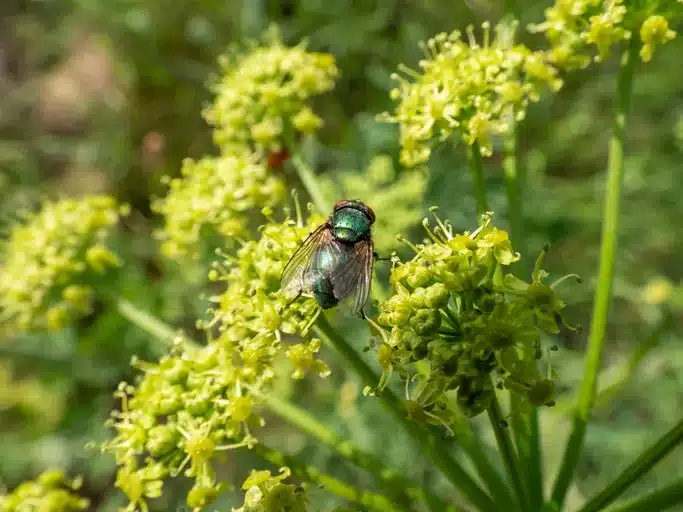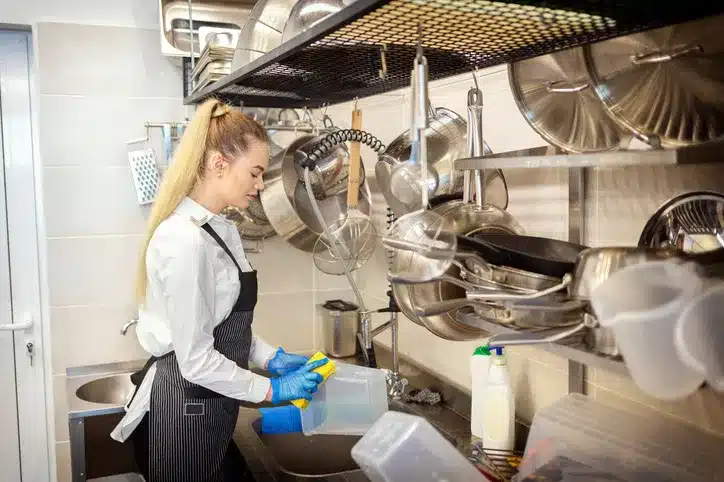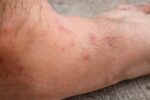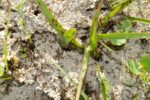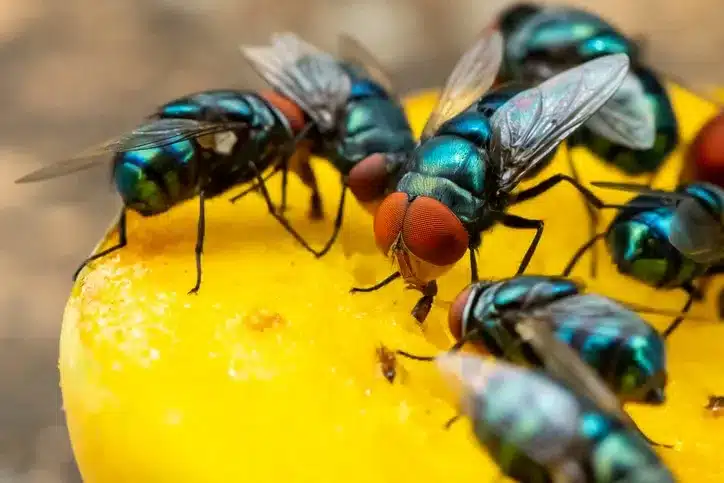
How to Keep Flies Out of Your Restaurant
For restaurant owners wondering how to get rid of flies in your restaurant, commercial fly control is often the best option. Nothing damages the image of your establishment like having bugs inside. While flies are a fact of life, this doesn’t mean you can’t do something about them. Ensure that your guests dine fly-free and keep the bugs at bay for good with Hulett Environmental Services’ commercial fly control.
Not only do we offer top-of-the-line Florida pest control services, but we also provide all the tools and information you need to identify when flies have become a problem. In this blog, we will take you through fly prevention tips for your restaurant including the health hazards of flies, what attracts them to your restaurant, and helpful fly prevention tips for your restaurant.
The Health Hazards of Having Flies in Your Restaurant
Flies are more than just a simple unsightly annoyance. When a fly lands on your food or kitchenware, it can carry and transmit pathogens on its body and transfer them to the food that it lands on, potentially spoiling the food. When contaminated food is handled and consumed, the pathogens could potentially cause disease and illnesses such as Dysentery, Staphylococcus, Shigella, Salmonella, E-Coli, and worms.
Flies can cause food poisoning as well. Each time a fly lands, it regurgitates a portion of what was in its stomach, mostly bacteria, as a pre digestive onto the solid food to break it down into a liquid to aid in its feeding. During this process, food can become contaminated and create foodborne illness. It is estimated that house flies are capable of transmitting up to 65 diseases.
What’s Attracting All These Flies to My Restaurant?
Because flies transmit so much bacteria, it’s important to understand what’s attracting them so you can prevent them from harming your guests. Restaurants attract flies due to the large volume of food inside them. Flies are attracted to sugary substances like citrus fruit and soda, salt, meat, oil, and even alcohol. Abundant sources of food and breeding areas make your restaurant an attractive home for these pests.
They can also be attracted to large quantities of garbage and food scrap, like in the dumpsters you may keep out back. It is very important to store the garbage away from the structure, and have it emptied often. Air curtains, screens, and door sweeps can also help prevent these outside flies from invading.
Common Types of Flies
Did you know that there’s more than one type of fly? There are more than 110,000 different species of flies throughout the world, with more than 20,000 in North America alone. That’s a lot of flies. So which are most likely to appear in your restaurant or kitchen?
Fruit Flies
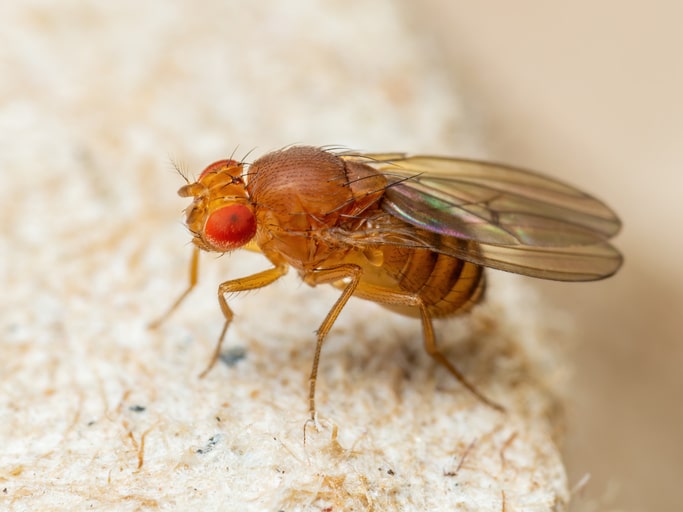
Fruit flies are tiny flies that may be mistaken for gnats. However, they tend to hover close to food and usually have big, red eyes. As their name implies, they’re particularly attracted to fruit. Fruit flies are also attracted to vegetables and other forms of sugar, like spilled soda.
Other areas you may find them include sink drains and garbage disposals, recycling bins, and near mops or wet towels. Any item or surface that has collected sugar is a potential feeding source for a fruit fly.
To keep the flies away, make sure your garbage is collected regularly, and that produce is disposed of once it is overripe. Clean up any soda, juice, or alcohol spills on the floor right away with a proper cleaning solution, as a simple water rinse can still leave behind a sugary residue.
Phorid Flies
Phorid flies are also referred to as “scuttle flies” or “humpbacked flies”. This is because they have a tendency to run, rather than fly. Also, their bodies have a noticeable humpbacked appearance, normally with a yellow and brown striped abdomen.
Phorid flies live, feed, and breed in various sites found within a restaurant or kitchen. They often breed near drains, plumbing, and utilities, and may fly towards foods in which they are attracted, particularly potatoes and onions. Once they’ve made their home in your sinks or drains, you’ll likely need commercial fly control to eradicate the problem.
Blowflies
Blowflies are another common restaurant pest. These are the noisy flies that seem to shine blue, green, and black as they buzz around. They’re considerably larger than other fly species and can reach 10mm, or almost half an inch, in length.
Blowflies can be attracted to dumpsters or trash, and are often in search of raw meat or other sources of decaying matter. Blowflies may also indicate that there are dead animal bodies in a structure. This can sometimes mean that the building has rodents that are infesting, so a proper inspection by a professional pest control company is very important to make sure that any rodent issue is resolved.
House Flies
House Flies are most easily identified by their large transparent wings and big brown or red eyes. Their primary food source is sugary substances, so you’ll likely find them near the sweets and citrus in your restaurant, but also decaying matter that you may find in the trash.
Once they’ve found a suitable breeding site, they reproduce very quickly, and severe infestations may require professional fly control. If you find their breeding site, you may see thousands of worm-like maggots wriggling around your food or trash, these are the immature stages of the fly.
How To Prevent Flies in Your Restaurant
The variety of attractants your restaurant has inside makes commercial fly control extremely important to keep flies away. Garbage should be stored and disposed of in a hygienic fashion. Waste containers should be tightly sealed by a lid at all times, and emptied and cleaned regularly.
Restaurant staff should also make sure that food and utensils are stored properly and cleaned prior to use, and that floors, drains, under equipment, and food preparation areas are cleaned often. Sanitation is key.
Controlling indoor flies includes identifying what the bugs are attracted to and determining how to eliminate their source of food and breeding grounds. Fly lights, fly traps, or fly tape may be used as well to catch adult flies, helping to prevent them from infesting food and trash, or to help prevent them from breeding.
Professional Fly and Pest Control
Restaurant owners need to know how to keep flies away, and professional fly control is the best method to both eradicate and prevent future infestations. It’s vital to employ a professional to address the problem, as fly control shouldn’t just take place inside your establishment, but on the outside as well.
The professional and certified technicians at Hulett that are trained will know where to look, how to identify the root cause of the problem, and effectively treat the pests.
Schedule Commercial Fly Control With Hulett Environmental Services Today
Here at Hulett Environmental Services, we have an expert team of commercial fly control specialists to assist you and your business. Your reputation is of the utmost importance to our team. We will take the time to develop the most effective course of action to rid your restaurant of pesky fly problems. Contact us today for a free inspection.

